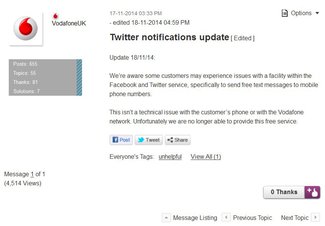Not @vodafone
It was during my November trip to Australia that I noticed I had stopped getting SMS Twitter alerts. I find it convenient to use SMS to forward the tweets of a couple of close friends whose updates I don't want to miss, and also to send me @replies for quick answers when I need them.
I assumed a vagary of international gateways. Sometimes you come back to the UK and get a stream of stalled messages.
Not this time. I found instead that as of November 15, 2014 Vodafone stopped supporting SMS alerts from (or, as far as I can tell, posting to) Twitter. My Twitter settings now included this message:
![]()
I also found this, in a Vodafone forum:
Cute Twitter button at the bottom there.
And another frustrated Vodafone user looking for alternatives.
For some things push really is better than pull (though not as many as Wired thought in 1997). Replacing the SMS functions I use with a Twitter app is sub-optimal. Both the phone and Twitter feel disabled without the SMS connection, especially at times when data isn't available (Vodafone's roaming charges are prohibitively high). Plus there's the "liveness" factor: if you're in central Liverpool searching for a (physical) mailbox you ask and the messages come to you. You feel connected. In 2008, before UK operators and Twitter were on SMS-trading terms, it was a frequent geeky plaint that people would gladly pay for the service if they *could*. How much was never specified.
On January 2 I began the process of changing phone companies. "Why are you leaving?" asked Vodafone customer service before handing over the PAC number. Naturally, he knew nothing about any Twitter problem. Nor did the woman who called me a day later asking me the same questions. I balked at answering twice. "But I'm from the retention team," she said. So? Talk to your customer service guy. A side benefit: the new supplier has a much better deal on data, both domestic and international.
In response to my emailed query, Vodafone said: "We're delighted to carry Twitter text messages on our networks under the standard commercial arrangements between operators. We do this successfully in a number of countries. Unfortunately, in some countries, Twitter was using a loophole in our systems to deliver text messages without paying us. Wherever this happens, we won't be able to deliver text messages from Twitter. We are working with Twitter to correct this, and we look forward to delivering Twitter messages on the same commercial basis as other SMS services in future." Twitter didn't answer.
Of course it's about money. But what happened? The 2009 Twitter-Vodafone announcement noted a signed agreement. Did it expire? Did Twitter's loophole in "some countries" include the UK, or are we paying for agreement-breaking behavior in other countries? Did Vodafone think Twitter is too out of fashion to matter? Did Twitter base its business model on fragile favored-nation status? The last is likely moot now: SMS doesn't directly generate revenue.
But it does engage users. Twitter's 2013 annual report, indicates that although desktop timeline views are more lucrative than mobile ones, over 70 percent of Twitter's advertising revenues come from mobile. In 2008, the last time Twitter stopped UK SMS alerts, before the company had revenues, "Gigaom reported that Twitter co-founder Biz Stone estimated the cost of termination fees at $1,000 per user per year. Would people have paid that much?
This situation is the kind of thing Donald Norman wrote about in his 2011 book, Living with Complexity: it's not complexity that drives us mad it's confusion. All of us are capable of accomplishing cognitively very complex tasks, like driving to a strange place in an unfamiliar vehicle yet quail at the thought of setting up a modern home cinema system. In this case users have no idea whom to blame or how to fix it. Each service designs its own systems and makes its own financial arrangements with little reference to how they interact with others. Even when there's someone to call - as there must be with a paid service like Vodafone - the likelihood that customer service will know anything about a problem that affects a niche minority of users is negligible. The retention team's best strategy was the losing proposition of trying to convince me that the Twitter thing doesn't matter - which is why I stopped answering their multiple calls a day. (Look, I know this is a 20-year relationship I'm abruptly severing, but you're a big, grown-up phone company now and I've told you why.)
This is why open networks and network neutrality matter. SMS is a controlled, closed system that Twitter can only access by payment or agreement with each mobile network operator. Email is an open system anyone can use. As data roaming charges slowly vaporize and all-you-can-eat data becomes the norm, SMS may join CB radio as something we needed for a time but that subsequent developments have relegated to niche status. For the moment, the Twitter/Vodafone situation is disturbingly analogous to the recurring blackout disputes between US broadcast networks and cable companies. It's a reminder of the way closed systems can hurt consumers.
Wendy M. Grossman is the 2013 winner of the Enigma Award. Her Web site has an extensive archive of her books, articles, and music, and an archive of earlier columns in this series. Stories about the border wars between cyberspace and real life are posted occasionally during the week at the net.wars Pinboard - or follow on Twitter.
